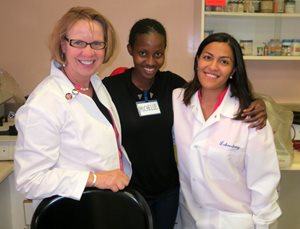Meza, originally from Los Angeles, was one-fourth of a team of pathology professionals sent by the American Society of Clinical Pathology (ASCP) to southern Africa on a global health trip August 1-13. Their mission was to instruct 17 participants in the theory behind the histotechnology practices outlined in their instruction manuals.

Histotechnology is the process of grossing, or cutting, fixing and staining a tissue sample on a slide to be examined and diagnosed by a pathologist.
Cherie Germain, P.A., director of WVU’s PA Program, recommended Meza for the team because of her prior histology experience and her experience working with limited resources in an Army combat support hospital.
In addition to Meza, the team included three histotechnicians with more than 35 years of experience each. Glenda Hood H.T., is program director of the histology program at Tarleton State University in Texas; Jean Mitchell, H.T., is a muscle expert at the University of Wisconsin Hospital; and Robert Brunner, H.T., is chairperson of the ASCP Board of Certification Histotechnology Committee and a technical consultant for Leica Microsystems, which produces histology equipment.
“I was the only one with grossing experience,” said Meza of her role on the trip.
She said WVU’s PA program prepared her both in course work and in experience giving presentations. She taught an introductory lesson in grossing small, non-complex specimens.
“I used Play-Doh and different things, so it was good to be resourceful,” she said. “They had never seen Play-Doh before.”
There are currently only four pathologists in all of Botswana. Turnaround time for pathology results in the United States is about 24 hours, but in Botswana it can be two weeks for an urgent case. The country has responded to the deficiency, reaching out to organizations such as the ASCP for training and equipment.
According to Meza, the lead pathologist at NHL, Dr. Mukendi K. Alphonse Kayembe, said that at times he could barely make a diagnosis due to the poor quality of the slides. The participants had no concept of quality assurance, about making sure that each step was done correctly before the next one, Meza explained.
According to the report Meza wrote after the training, Dr. Kayembe noted that the slides he received were like night and day compared to before. On their evaluations, students left remarks such as, “You instilled a sense of confidence in me,” and “Now I think I can serve the patients efficiently and in timely manner.”
“I was just impressed by how much they actually appreciated the learning,” Meza said. “Every single day they would write on post-it notes what they liked, and every single day the comments were very positive. They didn’t want us to leave; they wanted us to come back.”
Meza is a first lieutenant and a lab manager in the U.S. Army Reserve, B Company 256th Combat Support Hospital. She enjoyed learning about global laboratory practices on this trip and intends to volunteer for future humanitarian missions.
Meza completed her B.S. in biology at the University of California, Davis in 2008 after leaving school briefly to join the Army’s laboratory technician training program in San Antonio. After graduating and obtaining her license in medical lab science, she worked at Landstuhl Regional Medical Center in Germany, returned to the States in 2011 and worked in San Diego as a clinical lab scientist, then entered WVU’s PA program in the spring of 2013.
Meza was also recently selected by the ASCP for a position as a Career Ambassador. In this position she will represent the ASCP, presenting to young adults and undergraduate students the opportunities available in the laboratory professions.
Photo identifications: Team member Jean Mitchell (far left), University of Botswana student Michelle Kuba (center) and WVU PA student Alejandra Meza after a day of practicing solutions and staining
